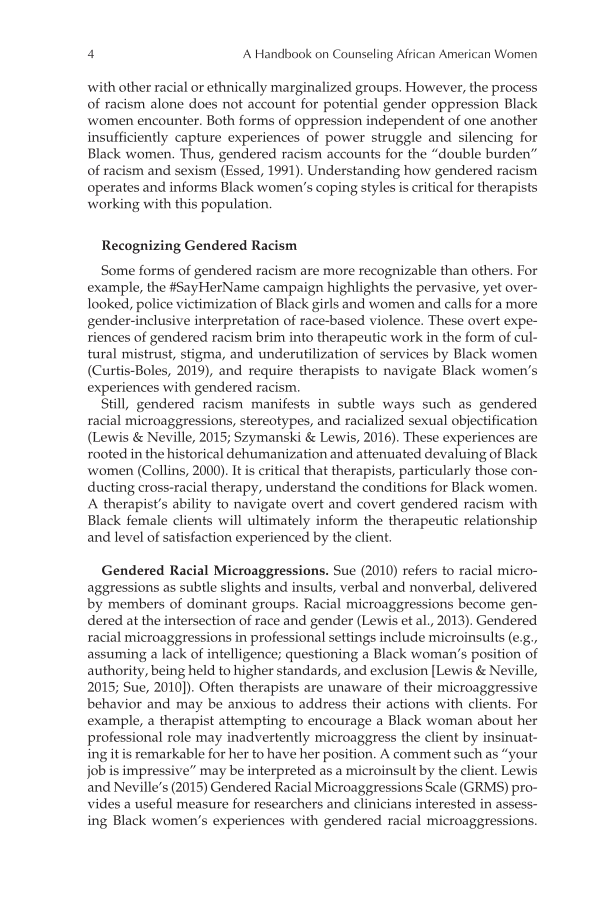4 A Handbook on Counseling African American Women with other racial or ethnically marginalized groups. However, the process of racism alone does not account for potential gender oppression Black women encounter. Both forms of oppression independent of one another insufficiently capture experiences of power struggle and silencing for Black women. Thus, gendered racism accounts for the “double burden” of racism and sexism (Essed, 1991). Understanding how gendered racism operates and informs Black women’s coping styles is critical for therapists working with this population. Recognizing Gendered Racism Some forms of gendered racism are more recognizable than others. For example, the #SayHerName campaign highlights the pervasive, yet over- looked, police victimization of Black girls and women and calls for a more gender-inclusive interpretation of race-based violence. These overt expe- riences of gendered racism brim into therapeutic work in the form of cul- tural mistrust, stigma, and underutilization of services by Black women (Curtis-Boles, 2019), and require therapists to navigate Black women’s experiences with gendered racism. Still, gendered racism manifests in subtle ways such as gendered racial microaggressions, stereotypes, and racialized sexual objectification (Lewis & Neville, 2015 Szymanski & Lewis, 2016). These experiences are rooted in the historical dehumanization and attenuated devaluing of Black women (Collins, 2000). It is critical that therapists, particularly those con- ducting cross-racial therapy, understand the conditions for Black women. A therapist’s ability to navigate overt and covert gendered racism with Black female clients will ultimately inform the therapeutic relationship and level of satisfaction experienced by the client. Gendered Racial Microaggressions. Sue (2010) refers to racial micro- aggressions as subtle slights and insults, verbal and nonverbal, delivered by members of dominant groups. Racial microaggressions become gen- dered at the intersection of race and gender (Lewis et al., 2013). Gendered racial microaggressions in professional settings include microinsults (e.g., assuming a lack of intelligence questioning a Black woman’s position of authority, being held to higher standards, and exclusion [Lewis & Neville, 2015 Sue, 2010]). Often therapists are unaware of their microaggressive behavior and may be anxious to address their actions with clients. For example, a therapist attempting to encourage a Black woman about her professional role may inadvertently microaggress the client by insinuat- ing it is remarkable for her to have her position. A comment such as “your job is impressive” may be interpreted as a microinsult by the client. Lewis and Neville’s (2015) Gendered Racial Microaggressions Scale (GRMS) pro- vides a useful measure for researchers and clinicians interested in assess- ing Black women’s experiences with gendered racial microaggressions.
Document Details My Account Print multiple pages
Print
You have printed 0 times in the last 24 hours.
Your print count will reset on at .
You may print 0 more time(s) before then.
You may print a maximum of 0 pages at a time.



















































































































































































































































































































































